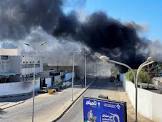Fighting resumed in Tripoli over the weekend as rival miitias battle for turf in the Libyan capital marked by heavy shelling in populated areas.
There was heavy bursts of gunfire as troops backing the internationally recognised government attempted to stop the advance of militia loyal to Fathi Bashagha.
Since last march Bashagha has been recognized as Libya’s prime minister by a parliament based in the eastern city of Tobruk
”It’s a turf war since 2011” says APA’s former correspondent in Tripoli Saleh Sarar, who speaks of civilian casualties as fighting takes place in heavily populated parts of the city where plumes of smoke were seen rising throughout the weekend.
Over 20 people, mostly civilians have died, according to the health ministry which says at least 140 more had been injured.
It said the shelling ostensibly by all sides to the recent flareup had hit hospitals.
Graduation exams for high school leavers have been cancelled as a result of the unrest.
Since the beginning of August, there has been a steady buildup of troops loyal to rival Prime Minister Abdul Hamid Dbeibeh recognised by the international community and those of soldiers aligned with Bashagha.
Aside from both men laying conflicting claims of being the country’s legitimate prime minister, they also clash over who should control the Libyan capital, which came to a head over the week as forces loyal to Debeibeh tried to stop Bashagha troops from gaining access to the city.
The result has been the violent clashes which took place on the outskirts of the city.
This has been described as the worst spate of unrest in Libya of the past two years.
The casualties on both sides are not known.
For over ten years now Libya has been a near-lawless country with a proliferation of disparate armed groups competing for turfs which promise them stakes in the distribution of its oil resource.
Since a Western-backed armed uprising toppled strongman Muammar Ghadaffi in 2011, stability has eluded the country which is politically divided into factions loyal to either the government in Tripoli or a rival authority based in Benghazi.
Although there has been a two-year period of relative stability, hostilities between protagonists on either sides of this political fault line had continued albeit at low intensity.
Any attempt by one faction to exert control over more than its immediate share of the turfs had been met with fierce force by other militias.
WN/as/APA


